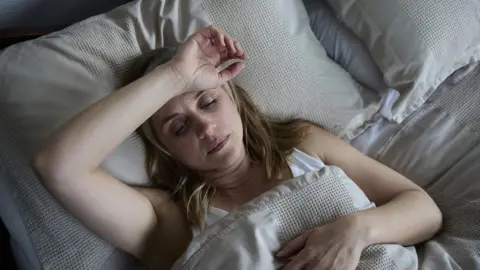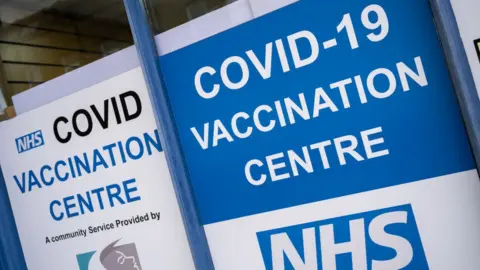Why Covid is still flooring some people
 Getty Images
Getty ImagesWhat is it like to catch Covid now? It is a question I have been pondering since a friend was surprised by how roughed up they were by it. Their third bout of Covid was significantly worse than the previous time they caught it.
"I thought every time you catch an illness it's supposed to be a bit better each time?" was the message from his sickbed.
That has certainly been said a lot during the pandemic. But I also know work colleagues and people I have interviewed or chatted to at the school gates, who have been hit hard by Covid in the past few months.
A familiar tale has been a week of coughing, headaches or fever followed by a lingering fatigue.
It is important to stress that Covid has always caused a wide range of symptoms. Even before vaccines, some lucky people barely got sick or did not even develop symptoms.
For some of us, Covid is just a sniffle - not even enough to make you go digging around in the bathroom cabinet to see if there is a lateral flow test hiding in there.
But scientists specialising in our immune system warn Covid is still causing stonking infections that may be worse than before and knock us out for weeks.
So what is going on?
How we fare after being exposed to Covid comes down to the battle between the virus itself and our body's defences.
The earliest stages are crucial as they dictate how much of a foothold the virus gets inside our body, and how severe it is going to be.
However, waning immunity and the virus evolving are tipping the scales.
'Feel pretty rough'
Prof Eleanor Riley, an immunologist at the University of Edinburgh, has had her own "horrid" bout of Covid that was "much worse" than expected.
She told me: "People's antibody levels against Covid are probably as low now as they have been since the vaccine was first introduced."
Antibodies are like microscopic missiles that stick to the surface of the virus and stop it from infecting our body's cells.
So, if you have lots of antibodies, they can mop up the virus quickly and any infection will hopefully be short and mild.
"Now, because antibodies are lower, a higher dose [of the virus] is getting through and causing a more severe bout of disease," Prof Riley says.
Antibody levels are relatively low because it has been a long time since many of us were vaccinated (if you are young and healthy you were only ever offered two doses and a booster) or infected, which also tops up immunity.
Prof Peter Openshaw, from Imperial College London, told me: "The thing that made the huge difference before was the very wide and fast rollout of vaccines - even young adults managed to get vaccinated, and that made an absolutely huge difference."
 Getty Images
Getty ImagesThis year even fewer people are being offered the vaccine. Last winter, all over-50s could have one. Now it is only the over-65s, unless you are in an at-risk group.
Prof Openshaw says he is not a "doomster", but thinks the result will be "a lot of people having a pretty nasty illness that is going to knock them out for several days or weeks".
"I'm also hearing of people having nasty bouts of Covid, who are otherwise young and fit. It's a surprisingly devious virus, sometimes making people quite ill and occasionally leading to having 'long Covid'," he says.
He thinks there is a "good chance" you are susceptible if you have not caught Covid in the past year.
The official government decision in the UK is to vaccinate those at risk of dying from Covid or needing hospital treatment. This relieves pressure on the National Health Service.
Prof Riley argues: "But that's not to say people who are under 65 are not going to get Covid, and are not going to feel pretty rough.
"I think the consequence of not boosting those people is we have more people who are off work for a week or two or three over winter."
Decisions on who gets vaccinated are not the only thing to have altered - the virus is also changing.
'Little immunity'
Antibodies are highly precise as they rely on a close match between the antibody and the part of the virus to which they stick. The more a virus evolves to change its appearance, the less effective the antibodies become.
Prof Openshaw said: "The viruses circulating now are pretty distant immunologically from the original virus which was used to make the early vaccines, or which last infected them.
"A lot of people have very little immunity to the Omicron viruses and their variants."
 Getty Images
Getty ImagesIf you are feeling rough with Covid - or rougher than you have done before - it could be this combination of waning antibodies and evolving viruses.
But this does not mean you are more likely to become critically ill or need hospital treatment.
A different part of our immune system - called T-cells - kick in once an infection is already under way and they have been trained by past infections and vaccines.
T-cells are less easily befuddled by mutating viruses as they spot cells that have been infected with Covid and kill them.
"They will stop you getting severely ill and ending up in hospital, but in that process of killing off the virus there's collateral damage that makes you feel pretty rough," says Prof Riley.
Relying on your T-cells to clear out Covid is what results in the muscle pain, fever and chills.
So where does this leave the thought that Covid is on a trajectory towards becoming a mild, innocuous infection?
There are four other human coronaviruses, related to Covid, that cause common cold symptoms. One of the reasons they are thought to be mild is we catch them in childhood and then throughout our lives.
Prof Openshaw is clear "we are not there yet" with Covid, but "with repeated infection we should build up natural immunity".
In the meantime will some of us have to suck up a grotty winter?
"I fear so," says Prof Riley.
Update 19 February 2024: After publication of the story we offered Prof Openshaw the opportunity to expand his final comment and he added: "The best way to get protected against severe disease is to be vaccinated and to be boosted with the updated vaccine if you are offered it. To avoid infection altogether, wearing a mask in high-risk situations is important".

Are you affected by the issues raised in this story? Share your experiences by emailing [email protected].
Please include a contact number if you are willing to speak to a BBC journalist. You can also get in touch in the following ways:
- WhatsApp: +44 7756 165803
- Tweet: @BBC_HaveYourSay
- Upload pictures or video
- Please read our terms & conditions and privacy policy
If you are reading this page and can't see the form you will need to visit the mobile version of the BBC website to submit your question or comment or you can email us at [email protected]. Please include your name, age and location with any submission.
